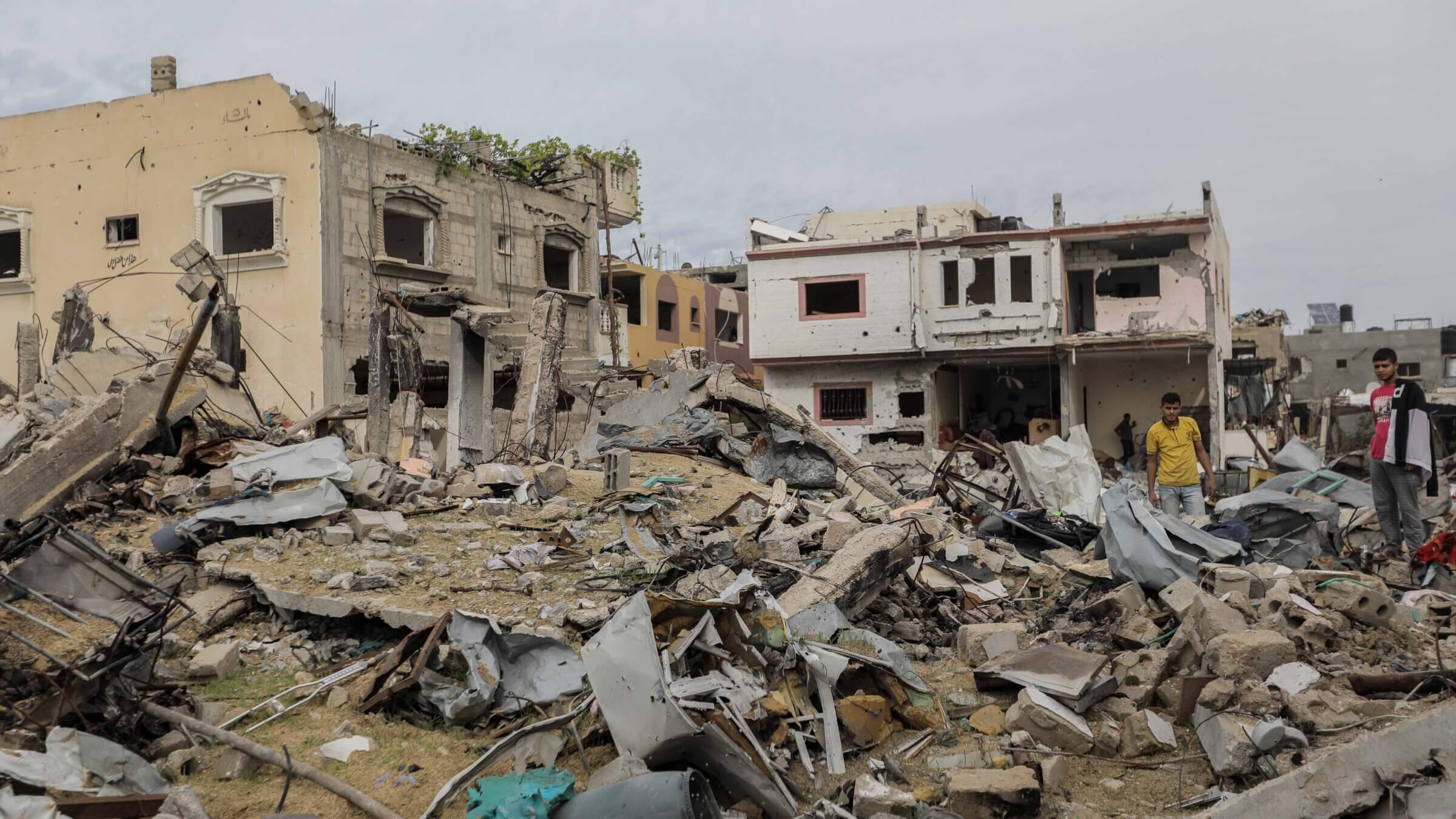War is hell, but it worked

Destruction caused by air strikes on homes in the Khuza’a area of Khan Yunis, Gaza. on Nov. 25. Photo by Ahmad Hasaballah/Getty Images
One of the most difficult truths in this war is that Yoav Gallant may have been right.
It was Gallant, Israel’s Defense Minister, who announced on Oct. 9, two days after Hamas’s Oct. 7 terror attack, that Gaza would be placed under a “complete siege,” with no food, water or electricity.
It was Gallant who made the decision to pummel Gaza from the air, and to send in troops to kill Hamas fighters and blow up their tunnels.
That campaign has so far taken 14,000 Palestinian lives, according to the Hamas-run Gazan Health Ministry, and the lives of, at last count, 70 I.D.F. soldiers. More than 1.7 million Gazans are homeless. At least 4,609 of the dead are children. According to U.N. and WHO calculations, that’s 136 dead children per day, a number that dwarfs the child casualty rates of other modern wars.
I see the heartrending pictures of the helpless people these numbers represent. The news I read tells the stories of the 1,200 Israeli and foreign nationals whom Hamas slaughtered on Oct. 7, and of the innocent victims of Israel’s overwhelming response.
And now the news is telling me something else: All this violence has worked.
And for all that my instincts could not be more naturally out of line with Gallant’s, his approach, however brutal, has worked.
From the beginning, Gallant believed that Hamas had no intention of releasing hostages. At the same time, Israel’s political leaders got a clear message from the people who live near the border with Gaza: Either Hamas goes, or we do.
So Gallant destroyed Gaza. Israel got a green light from President Joe Biden and then proceeded to run all the other red ones, ignoring the advice of foreign governments and protesters.
And Hamas buckled.
“It’s hard to imagine a clearer signal of Hamas’s desperation than the deal agreed to by the Israeli government late Tuesday,” wrote Haviv Rettig Gur in The Times of Israel last week.
Initially, I believed there had to be a better way. Beyond the humanitarian disaster brought to Gaza by the Israeli war machine, I found it difficult to imagine that Israel’s long-term strategic interests could possibly be served by becoming an international pariah.
But now, as Hamas has so far upheld the terms of a hostage release deal many of us could never have imagined, seven weeks ago, they would have ever agreed to, I have to ask myself: Would a less devastating method have worked?
If Israel had held off on attacking unless Hamas returned the hostages and its senior leaders surrendered, could it have built on the initial international outrage over the Oct. 7 massacre to create a coalition of pressure on Hamas?
It’s nice to think so. But the way that so many across the world have worked to justify Hamas’s atrocities calls into question how long Israel’s clear moral upper hand might actually have lasted. And the longer Hamas dragged out the hostage release, the more attention it would have garnered, and the more power it would have accrued. The group held just one soldier, Gilad Shalit, captive from 2006 to 2011, working to leverage greater gains from Israel in exchange for his release.
“This is key to understanding the war,” wrote Rettig Gur. “Israel isn’t speaking to the West.”
Instead, “Its message is for Hamas, and this message is the strategic heart of the war effort,” he wrote: “None of the tactics that once kept you safe apply anymore.”
The result was a prisoner swap that has so far brought 37 hostages home. If the trickle of hostages turns into a steady stream, it will be easy to question whether the cost was worth it, but harder to argue that it didn’t work.
But it has worked at a profound cost. Israel secured northern Gaza through a bombing campaign that only the most blinded apologists would call “surgical.” The stories of entire Palestinian families wiped out, and images of children limp and bloodied in their fathers’ arms: those are the cost of our celebration.
We must recognize that cost even as we debate its value. American Jews have a long, convenient history of looking away from Israeli violence. “What none of you manage to understand, for all your brains,” Amos Oz quoted an unnamed Israeli warrior saying in his seminal book In the Land of Israel, “is that the dirty work of Zionism isn’t finished yet.”
The horrors of Israel’s campaign are plastered across all of our social media accounts. Supporters of Israel must be honest about, and reckon with, the “dirty work”…
Read More: War is hell, but it worked

